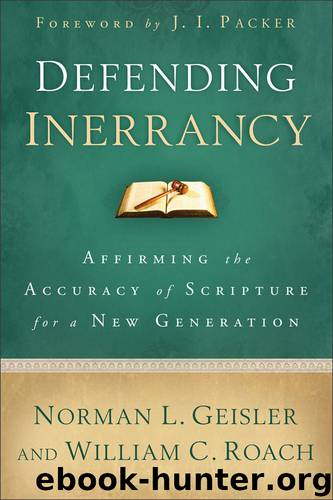Defending Inerrancy: Affirming the Accuracy of Scripture for a New Generation by Geisler Norman L. & Roach Bill

Author:Geisler, Norman L. & Roach, Bill [Geisler, Norman L.]
Language: eng
Format: epub
Tags: REL006000, authority, REL067030, Bible—Evidences
Publisher: Baker Publishing Group
Published: 2012-01-01T00:00:00+00:00
Official ICBI Commentary on the Chicago Statement
The following are important excerpts from the official ICBI commentary on the Chicago Statement on inerrancy (1978).
Article 12 Selections
It has been fashionable in certain quarters to maintain that the Bible is not normal history, but redemptive history with an accent on redemption. Theories have been established that would limit inspiration to the redemptive theme of redemptive history, allowing the historical dimension of redemptive history to be errant. (Sproul, Explaining Inerrancy [EI], 36)
Though the Bible is indeed redemptive history, it is also redemptive history, and this means that the acts of salvation wrought by God actually occurred in the space-time world. (37)
Article 13 Selections
When we say that the truthfulness of Scripture ought to be evaluated according to its own standards that means that . . . all the claims of the Bible must correspond with reality, whether that reality is historical, factual or spiritual. (EI, 41)
By biblical standards of truth and error is meant the view used both in the Bible and in everyday life, viz., a correspondence view of truth. This part of the article is directed toward those who would redefine truth to relate merely to redemptive intent, the purely personal, or the like, rather than to mean that which corresponds with reality. (43–44)
Article 18 Selections
When the quest for sources produces a dehistoricizing of the Bible, a rejection of its teaching or a rejection of the Bible’s own claims of authorship, [then] it has trespassed beyond its proper limits. . . . (EI, 55)
We affirm that the text of Scripture is to be interpreted by grammatico-historical exegesis, taking account of its literary forms and devices, and that Scripture is to interpret Scripture. We deny the legitimacy of any treatment of the text or quest for sources lying behind it that leads to relativizing, dehistoricizing, or discounting its teaching, or rejecting its claims to authorship. (Art. 18, emphasis added)
By biblical standards of truth and error is meant the view used both in the Bible and in everyday life, viz., a correspondence view of truth. This part of the article is directed toward those who would redefine truth to relate merely to redemptive intent, the purely personal, or the like, rather than to mean that which corresponds with reality. (EI, 43–44)
Thus, what Scripture says, God says; its authority is His authority, for He is the ultimate author. . . .” (Packer, “Exposition,” 69)
ICBI Commentary on Hermeneutics
Also, an official commentary on the ICBI Hermeneutics Statement (1982), “Explaining Hermeneutics” (EH), was composed. The following are some relevant excerpts from it:
EH on article 13: “We deny that generic categories which negate historicity may rightly be imposed on biblical narratives which present themselves as factual. . . . Some, for instance, take Adam to be a myth, whereas in Scripture he is presented as a real person. Others take Jonah to be an allegory when he is presented as a historical person and [is] so referred to by Christ” (emphasis added).
EH on article 14: “We deny that any event,
Download
This site does not store any files on its server. We only index and link to content provided by other sites. Please contact the content providers to delete copyright contents if any and email us, we'll remove relevant links or contents immediately.
The Five People You Meet in Heaven by Mitch Albom(3548)
The Secret Power of Speaking God's Word by Joyce Meyer(3152)
Real Sex by Lauren F. Winner(3001)
Name Book, The: Over 10,000 Names--Their Meanings, Origins, and Spiritual Significance by Astoria Dorothy(2967)
The Holy Spirit by Billy Graham(2938)
0041152001443424520 .pdf by Unknown(2841)
How The Mind Works by Steven Pinker(2809)
ESV Study Bible by Crossway(2770)
Ancient Worlds by Michael Scott(2665)
Churchill by Paul Johnson(2574)
The Meaning of the Library by unknow(2558)
The ESV Study Bible by Crossway Bibles(2543)
The Gnostic Gospels by Pagels Elaine(2515)
MOSES THE EGYPTIAN by Jan Assmann(2410)
Jesus by Paul Johnson(2348)
City of Stairs by Robert Jackson Bennett(2337)
The Complete Dead Sea Scrolls in English (7th Edition) (Penguin Classics) by Geza Vermes(2269)
The Nativity by Geza Vermes(2221)
Ancient Near Eastern Thought and the Old Testament by John H. Walton(2217)
